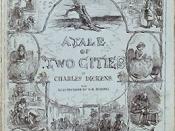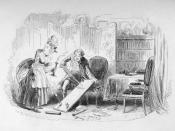Oppression in A Tale of Two Cities
In the book A Tale of Two Cities, one of the many themes present is that of oppression. There are many examples of this throughout the book, some more obvious than the others.
We can see right away in the beginning that the French peasants are under a hideous oppression by the French aristocracy. All the people of the towns that are described are starved and in great pain, they are depressed and slinking about, gaunt skeletons of human beings. Their desperation is clearly evident in Chapter 5, when everyone nearby rushes to lick wine off of the city street when a barrel of it bursts after being dropped. As this is occurring, the wealthy French citizens are reclining indoors and use a ridiculous number of servants just to prepare a cup of hot water. When a poor man's son is run over and killed by the rich Marquis's carriage, the Marquis makes no apology, and tosses a couple coins at the grieving father.
The aristocrats did not even think the peasants human; they treated them as animals, without a thought to their happiness or well being.
Another example of oppression is in Mrs. Cruncher's relationship with her husband. Mr. Cruncher orders her about, and treats her like a piece of property, just there to do his will and stay out of his way. When Jerry Cruncher catches his wife praying for his thieving soul, he takes it to mean that she wants him to be caught and punished, so he will stop grave robbing. His son sees him the next morning bashing his wife's head into the headboard of their bed as a punishment for her prayers. Mrs. Cruncher lived in a constant oppressive atmosphere as she tried to conform to...



Good Job
A good essay. There were a lot of good examples in this essay of opression.
2 out of 2 people found this comment useful.